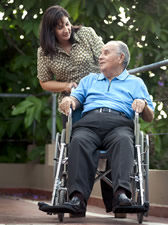Traveling and Holidays

Holiday Season 
The holiday season is a cheerful time to spend with your loved ones but it is also a time of increased stress due to high demands and expectations. With some planning and small adjustments, the holidays can remain joyful and memorable occasions. Here are some tips to make this time as cheerful as possible:
- Stick to a routine or schedule
- Familiarize others with the situation
- Adjust expectations
- Involve the person with dementia in planning
Continue to focus on activities that your loved one finds meaningful and comfortable. You can build on past traditions and memories. Try to involve them in holiday preparation as their abilities allow. They can help prepare food, wrap gifts, or decorate.
Try to let guests know what to expect before they arrive or before visiting them.
It may be easier to share changes in your loved one’s health in a letter or email. Make sure they understand that any changes in behavior and memory are from the disease and not caused by the person. Talk to your family and friends about your situation and be realistic about what you will be able to do during the holiday season. Be fair to yourself and only do what you can reasonably manage.
Traveling With a Person With Dementia
Traveling with a person with dementia can be challenging. Traveling to a new place brings a variety of people, sights, and objects. While some persons with dementia may manage these changes with ease, others may feel confused and experience some anxiety. Below are a few tips that may help ease the transition.
Keep Your Existing Schedule
Try to keep the same schedule throughout your trip. This will give your loved one a sense of stability. If possible, wake up times, mealtimes, bath times, and bedtimes should be on the same schedule you use at home.
Avoid Exhaustion 
It could help to only schedule one or two events a day to avoid exhaustion. Exhaustion could lead to disorientation and the person may want to return home. Allowing time for rest between activities can help the person relax and enjoy the trip. Quiet time can occur in an empty lounge, a quiet corner of a hotel lobby or store, or a secluded restroom. Rest breaks help prevent exhaustion, confusion, wandering behaviors, and anger outbursts.
Bring Favorite Items
Bringing a favorite blanket, pillow, or picture for the bedside table brings some familiarity to the new place you are traveling. The look of sameness and routine can help your loved one stay oriented.
Should Your Loved One With Dementia Travel?
It is important to determine if your loved one is able to travel and what limitations need to be considered. Plan for frequent rest breaks, snacks and food, medications, and activities to keep your loved one engaged. Changes in your loved one’s environment can cause confusion and disorientation. Try to keep the environment as familiar as possible by keeping holiday decorations simple. Allow time for adjustment to any unfamiliar settings.
In the later stages of dementia, it may be more comfortable for the individual with dementia to stay home while the caregiver travels alone or with a friend. Day health care programs or adult living facilities could be an option for your loved one while you travel. Some nursing homes offer respite services, residences for a weekend, or up to a few weeks at the facility. To learn more about the types of caregiver assistance that may be available to you and your loved one, please refer to the section on Support for the Caregiver.
Additional Resources 
VA Resources 
US Department of Veterans Affairs
VA values your commitment as a partner in our pledge to care for those who have "borne the battle." We have several support and service options designed with you in mind. The programs are available both in and out of your home to help you care for yourself and the Veteran you love.
- Caregiver Support Network
- VA Caregiver Support Line: 1-855-260-3274
- Additional Tips & Tools: Managing Medicines, Talking with your Provider, Caring for Oneself, Disaster Planning, Staying Organized, Moving Around Safely
Geriatrics and Extended Care Services (GEC) is committed to optimizing the health and well-being of Veterans with multiple chronic conditions, life-limiting illness, frailty or disability associated with chronic disease, agining or injury. This VA site reviews information on delirium, dementia and Alzheimer's care, decision making, home and community based services, and advance care planning, among many other important topics that may be important for you as a caregiver.
Veteran's Crisis Line Phone: 1-800-273-8255 (Veterans Press 1)
The VA does not endorse the following resources or guarantee that their information is 100% accurate. However, you may be able to find some helpful information by visiting the following pages:
Alzheimer's Association
Alzheimer's and Dementia Caregiver Center's tips for holidays and traveling.
References: Information adapted from Alzheimer’s Association
If you have any questions or concerns, contact Dementia Caregiver Web Support.



















